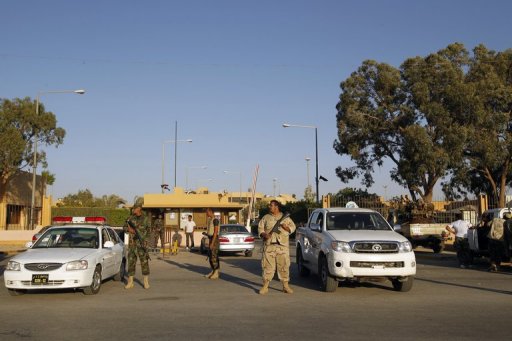AJDABIYA: NATO refused Friday to apologize for a deadly airstrike on Libyan rebel tanks and dismissed talk of a military stalemate, as the insurgents regrouped their scattered forces in the east.
British Rear Admiral Russell Harding, deputy commander of NATO’s Libya operations, said the military alliance had been unaware that the opposition was using tanks.
"It would appear that two of our strikes yesterday may have resulted in the deaths of a number of TNC forces who were operating main battle tanks," he said, referring to the rebels’ Transitional National Council.
When asked if the alliance had apologized to the rebels, Harding told reporters: "I’m not apologizing."
"The situation on the ground, as I said, was extremely fluid and remains extremely fluid. Up until yesterday we had no information that the TNC or opposition forces were using tanks," he said.
"Our role is to protect civilians. Tanks have been used in the past to directly target civilians," Harding said in a video news conference from NATO’s Libya operations headquarters in Naples, Italy.
It is the second time in less than a week that NATO warplanes accidentally strike rebel positions near Brega.
The alliance has concluded that last week’s bombing was an "unfortunate accident" and the rebels themselves admitted its fighters had made a "mistake" by firing tracers in the air, prompting warplanes to act in self-defense.
The latest incident took place when a rebel armored column was hit on Thursday by an air strike near Brega, 80 km west of Ajdabiya, which the rebels blamed on NATO forces enforcing the no-fly zone over Libya.
General Abdelfatah Yunis, the insurgents’ commander, said in their stronghold Benghazi that four people — two fighters and two medics — were killed in the Brega attack, 14 wounded and another six people were missing.
He said it was friendly fire, "carried out in error by NATO," adding that the rebels had informed NATO that they were moving T55 and T72 heavy tanks from Benghazi to Brega.
"We suffered a setback today," he added, but said the rebels have 400 tanks and will get more.
An AFP reporter said Ajdabiya, 860 km east of Tripoli, was Friday firmly in the hands of the rebels, who returned to their posts after fleeing in vast panicked numbers the previous day.
The town was largely deserted of civilians however, with shops shuttered and only a few scattered fighters to be seen in the streets.
Fighters manning a checkpoint at the western gate of Ajdabiya said Thursday’s panicked flight had been caused by the air strike on their armored column, as well as the fact that Qaddafi’s forces had landed Grad rockets near the town.
With rumors flying that Qaddafi’s forces were at the gates of Ajdabiya, thousands of civilians and some insurgents stampeded towards Benghazi, some 160 km away.
The rebels said their forces had regrouped Friday back at the frontline, which they indicated remained somewhere between Ajdabiya and Brega though they could not say exactly where. They refused to let journalists travel towards the front.
Techer-turned-fighter Ashraf Said, 34, said the rebels had on Thursday not fled Ajdabiya but had merely made a tactical withdrawal.
"Qaddafi’s forces attacked from three directions and four GRAD rockets landed near here," he told AFP.
"Different groups went off in different directions because we were worried we would be surrounded," he added.
With little headway being made by the rebels on the battlefield despite the support off NATO airpower, General Carter Ham, head of US Africa Command, said in Washington it was unlikely they could launch an assault on Tripoli and oust Qaddafi.
Asked at a Senate hearing about the chances that the opposition could "fight their way" to Tripoli and replace Qaddafi, Ham replied: "Sir, I would assess that as a low likelihood."
His comments underscored growing concern in Washington and European capitals that the conflict is heading toward a stalemate, with Qaddafi firmly in control in Tripoli and badly organized rebels unable to turn the tide.
But Harding denied there is a stalemate and said on Friday rival forces had been "moving up and down" a highway between Brega and Ajdabiya in the past 48 hours.
"If someone wants to define that as a stalemate that’s fine, all I’m saying is that yes, it’s fluid, but it’s fluid in a relatively small area," he said during the videoconference.
Besides being routed in the east, the rebels are struggling to defend Misrata, Libya’s third city, under an onslaught from better armed regime forces.
The UN announced that a World Food Program (WFP) ship carrying food, medicines and doctors, arrived late Thursday at Misrata with 600 tons of foodstuffs "enough to feed more than 40,000 people for a month."
The WFP also sent two doctors to the city, as well as enough medical supplies from the UN’s children’s agency UNICEF and the World Health Organization to cover the urgent needs of 50,000 people for a month.
Misrata, about 215 km (130 miles) east of Tripoli, has seen fighting for more than 40 days since the start of the uprising against Qaddafi. Doctors said last week that 200 people had been killed there since the fighting began.
Meanwhile, a UN human rights team set up to investigate violations in Libya will leave Sunday from Geneva to undertake a field mission, the head of the team, Cherif Bassiouni said Friday.
"Our travel schedule for reasons which you’ll appreciate is not going to be made public," said Bassiouni, who heads the team of three.
The 47-member UN Human Rights Council had unanimously decided to set up the investigation into suspected crimes against humanity after Qaddafi’s regime dispatched Libya’s army and air force to fire on civilians.


